119 videos match your search.
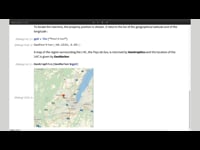 |
Bruno Autin The study presented here develops general principles from the initial design decided upon at CERN for the LEP/LHC circle in the 1980s. These principles could be applied to other ... |
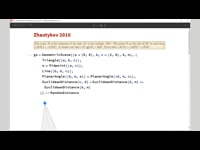 |
Shenghui Yang This talk from Shenghui Yang demonstrates how to use Wolfram Language functions to help us understand the idea behind the construction proof. Good visualization is critical to help focus on the important part in a complicated GeometricScene. He also shows the proper use of HatchFilling to highlight the featured area to outline pivot steps. Shenghui's Olympiad Euclidean geometry hobby and ... |
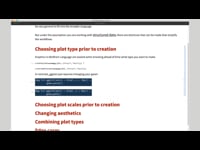 |
Andrew Yule This presentation features Andrew Yule discussing a new open-source project called ggplot that aims to create a Wolfram Language package giving functionality similar to R's ggplot. |
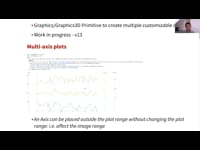 |
James Lane In this talk, James Lane introduces some of the new and experimental Graphics features in the 12.2.0 Mathematica front end. These include the new AxisBox primitive for creating customizable axes for ... |
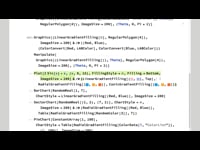 |
Yuzhu Lu In this presentation, Yuzhu Lu shows improvements and optimizations of existing Mathematica 2D and 3D Graphics language features, including texture and shading updates, 3D rotation gesture improvements, and performance enhancements of hit testing, rendering and printing. He also demonstrates some examples ... |
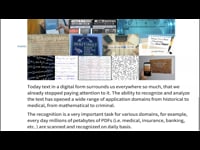 |
Mikayel Egibyan In this presentation, Mikayel Egibyan talks about the history and techniques used for handwriting recognition and analysis and demonstrates some solutions using neural networks trained on handwritten datasets. He also ... |
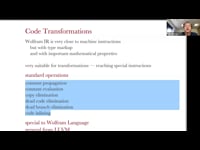 |
Tom Wickham-Jones In this talk, Tom Wickham-Jones describes ways that the Wolfram Compiler generates performant code, as well as some future directions. He shows applications for multi-core as well as grid computing. ... |
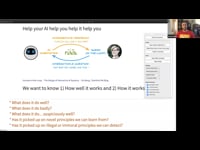 |
Jesse Galef In this talk, Jesse Galef highlights ways to use Wolfram Mathematica to gain insight into machine learning models, including both existing tools and projects being developed. This includes discussion of ... |
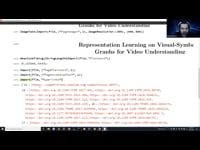 |
Sean Cheren, Robert Collyer Sean Cheren exhibits some of the exciting new Import/Export features coming in the next version of the Wolfram Language. In particular, he dives into format upgrades and useful updates ... |
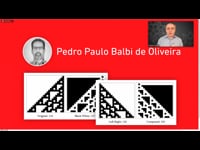 |
Stephen Wolfram |
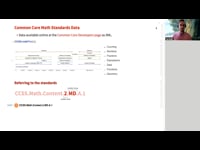 |
Jeremy Stratton-Smith, AnneMarie Torresen This talk covers the work that has been done to incorporate the Common Core math standards into Wolfram|Alpha and explore the content covered in the example pages. |
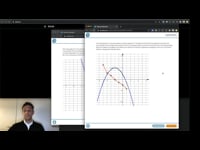 |
Chelsea Kharakozova, Maik Meusel MyLab provides customized learning experiences for millions of students. In this presentation, Chelsea Kharakozova and Maik Meusel show how interactive math exercises are created in the Wolfram Language and deployed ... |
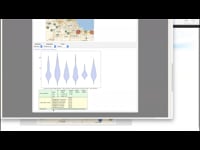 |
Anshu Manik, PhD In this talk, members of the Wolfram Technical Services group present work done to develop custom applications that had innovative interfaces backed with powerful engines and some very interesting concepts. ... |
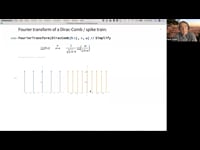 |
Markus van Almsick In this talk, Markus van Almsick reviews the most popular and most advanced interpolation methods and discusses their merits and shortcomings. |
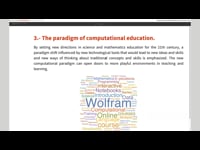 |
Silvia Paulina Toimil Davila Learn about new pedagogical ways of educating from an innovative perspective. In this presentation, Silvia Paulina and Toimil Davila discuss the growing need to create new learning environments for the ... |
 |
Etienne Bernard As part of the Wolfram Language, we developed efficient yet user-friendly machine learning tools aimed for use at both beginners and experts in the field. These tools include a neural ... |
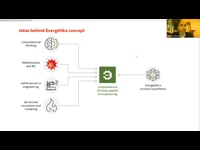 |
Gustavo Restrepo, Ph.D, Javier Guevara In this talk, the start-up company Exergetika will show part of their solutions developed in Mathematica for engineering projects in oil and gas, energy efficiency analysis and chemical industries and ... |
 |
Cliff Hasting, Kelvin Mischo Mathematica Online provides a browser-based environment to access notebooks with no installation or plugin, making it a nice complement to a local installation of Mathematica and allowing the user to access it from any internet-enabled device (laptop, Chromebook, iPad, etc.). Especially in today's world of online or hybrid courses and remote work, having access to and knowledge of how to utilize Mathematica Online along with Mathematica Desktop is instrumental so work is not slowed or stopped by lack of ... |
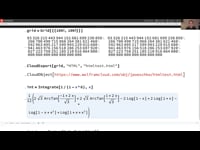 |
Jan Poeschko This talk is about how we put Mathematica on the web, from its early beginnings to our future plans for the Wolfram Cloud. Jan Poeschko discuss some challenges with implementing the notebook interface in web browsers, current limitations of the typesetting editor and how to work around them as a user. You will also learn a few things about the cloud object system, which is the basis for dealing with files in ... |
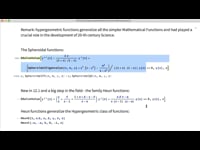 |
Tigran Ishkhanyan Wolfram Language has over 250 mathematical functions, including well-known elementary and special functions that have played a crucial role in the development of science for decades. Although this set is almost ... |